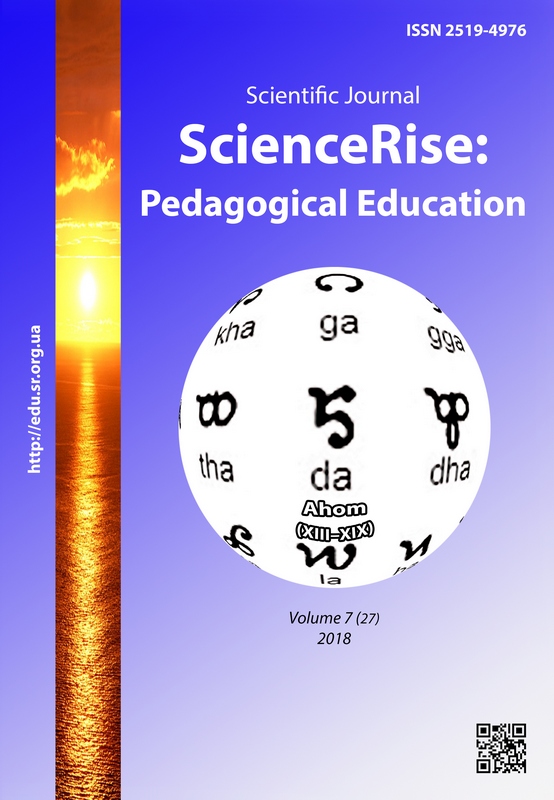Universal human values’ notion development in modern educational field
DOI:
https://doi.org/10.15587/2519-4984.2018.149259Keywords:
universal values, morality, value education, value approach, humanitarian education, axiologyAbstract
It is obvious that society is experiencing a lack of spiritual values such as mercy, sympathy, compassion, support and cooperation. In our opinion, problems in the field of morality exacerbated out of the loss of people’s understanding the meaning of their existence, life orientations on the background of underestimated (by itself) society and the state of value, education science, culture in the development (in general) and development of personality, rapid growth of social life’s commercialization. In the modern society, in connection with the change of ideological orientations and traditional foundations of education a certain vacuum occurred. And that requires reassessment and reconsideration of values, value attitudes in relation to the individual and family. It should be noted that the crisis state in the field of morality is not only an indicator of the serious problems presence, but at the same time rising of new opportunities. The category of value applies to the world of man and society. Outside a person and without a person, the concept of value cannot exist. Thus, value appears to be a primary category in relation to goals. It is on the values, value orientations of the individual that the nomination of certain goals depends on. The article explores the essential characteristics and content of human values from the modern pedagogical science’s point of view. The essence of the axiological "I" is determined. Topical definitions of universal values are considered. The analysis of axiological, sociological and axiopedagogical approaches to the content and essence of universal values is carried out.
This article defines an analysis of universal values, substantiates the opinions of the scientists in relation to approach and systematization of this phenomenon in modern science, identifies the theoretical and methodological principles of pedagogical and psychological research of the formation about universal human values, defines the main directions of an axiologically structured personality formation, emphasizes on the forming universal values of students in the system of a traditional university
References
- Bybler, V. S. (1990). Nravstvennost. Kultura. Sov-remennost: Fylosofskye razmishlenyia o zhyznennikh problemakh [Morality. Culture. Modernity: Philosophical thoughts about life problems]. Moscow: Znanye, 64.
- Maslow, A. (1999). Samoaktualyzyrovannie liudy: issledovanye psykhycheskoho zdorovia [Self-actualized people: studying mental health]. Saint Petersburg: Evrazyia, 320.
- Rodriguez, R. G., Rodriguez, J. L. (2008). Many Languages, One Nation: Valuing Bilingual Children, 201.
- Zahviazynskyi, V. Y., Zakirova, A. F., Strokova, T. A. et. al.; Zahviazynskyi V. I., Zakirov A. (Eds.) (2008). Pedahohycheskyi slovar [Pedagogical dictionary]. Moscow: Akademyia, 352.
- Branco, A. U., Valsiner, J. (2012). Cultural psychology of human values. Charlotte: Information Age Publishers, 312.
- Ovsianetska, L. P. (1998). Tsinnisni oriientatsii yak faktor zhyttiediialnosti rozvytku osobystosti [Valuable orientations as a factor of the life of personality development]. Zbirnyk naukovykh prats Prykarpatskoho universytetu imeni Vasylia Stefanyka. Seriia: Filosofiia, sotsiolohiia, psykholohiia, 66–70.
- Bekh, I. D. (2008). Vykhovannia osobystosti: pidruch. dlia studentiv vyshchykh navch. Zakladiv [Upbringing the personality: coursebook for students of higher educational institutions]. Kyiv: Lybid, 848.
- Asmolov, A. H. (1979). O nekotorikh perspektyvnikh yssledovanyiakh smislovikh obrazovanyi lychnosty [About some promising researches of the semantic personality forms]. Voprosy psykholohyy, 8, 35–46.
- Yurkevych, P. D. (1990). Fylosofskye proyzvedenyia [Philosophical works]. Moscow: Pravda, 670.
- Ball, H. O. (2000). Gumanizatsiya obshhego i professional'nogo obrazovaniya: sotsial'naya deyatel'nost' i psikhologo-pedagogicheskie orientiry. Nepreryvnoe profesional'noe obrazovanie: problemy iskaniy i perspektiv. Kyiv: Pulsari, 279.
- Yagupov, V. V. (2002). Pedagogika [Pedagogy]. Kyiv: Lybid, 560.
- Matusov, E., Lemke, J. (2015). Values in dialogic pedagogy. Dialogic Pedagogy: An International Online Journal, 3. doi: http://doi.org/10.5195/dpj.2015.141
Downloads
Published
How to Cite
Issue
Section
License
Copyright (c) 2018 Olena Andreieva

This work is licensed under a Creative Commons Attribution 4.0 International License.
Our journal abides by the Creative Commons CC BY copyright rights and permissions for open access journals.
Authors, who are published in this journal, agree to the following conditions:
1. The authors reserve the right to authorship of the work and pass the first publication right of this work to the journal under the terms of a Creative Commons CC BY, which allows others to freely distribute the published research with the obligatory reference to the authors of the original work and the first publication of the work in this journal.
2. The authors have the right to conclude separate supplement agreements that relate to non-exclusive work distribution in the form in which it has been published by the journal (for example, to upload the work to the online storage of the journal or publish it as part of a monograph), provided that the reference to the first publication of the work in this journal is included.







